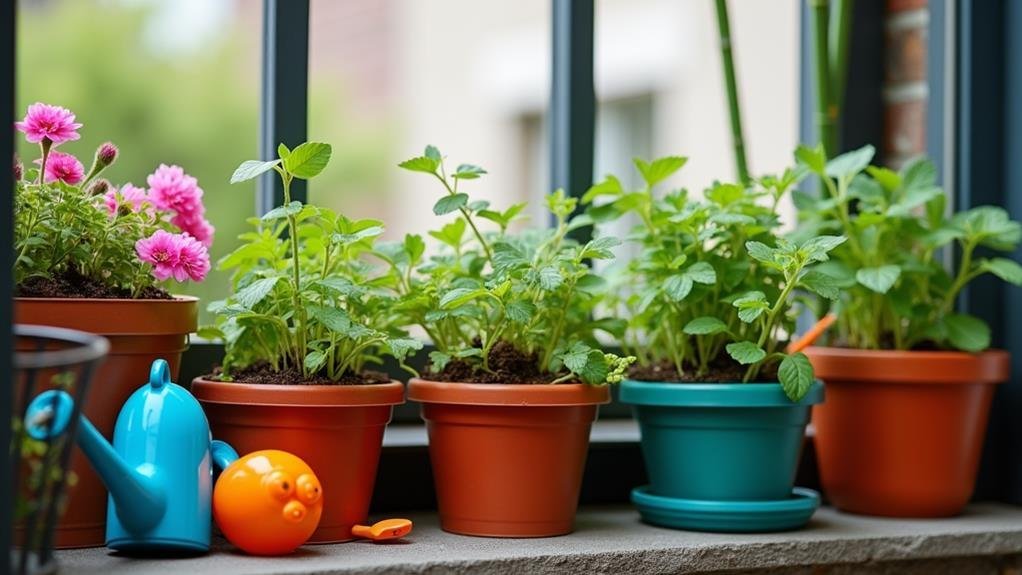When you start your gardening journey, having the right tools can make all the difference in your success. You might think that any old shovel or pair of gloves will do, but investing in quality items tailored for beginners can save you time and frustration. A sturdy trowel, efficient pruners, and reliable gloves are just the beginning. Each tool plays a vital role in shaping your experience, so understanding which ones to prioritize is essential. Curious about what else you'll need to cultivate your garden effectively?
Essential Hand Tools
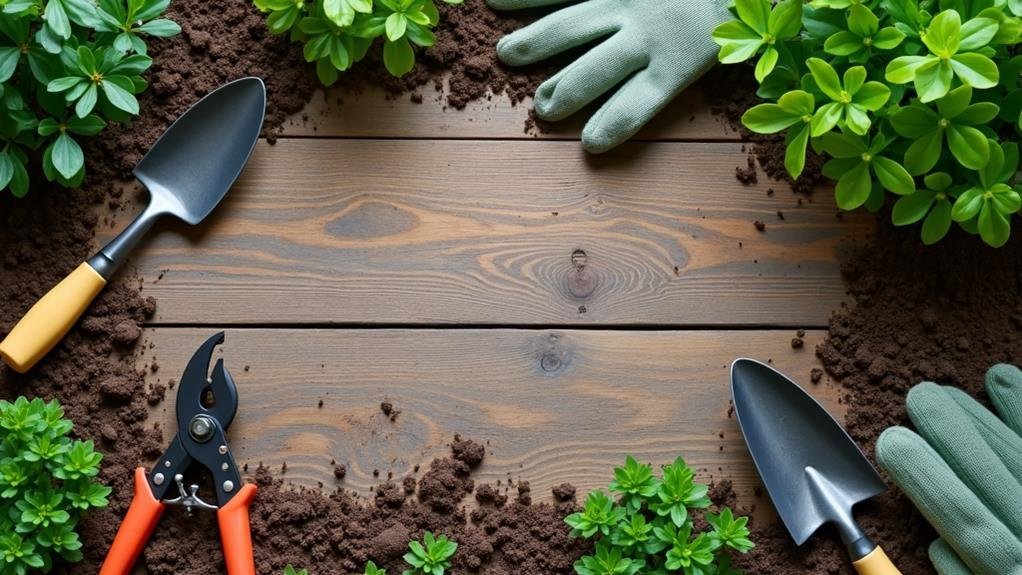
In relation to gardening, having the right hand tools at your side makes all the difference. To start your gardening journey, you'll want to equip yourself with a few essential hand tools that will simplify your tasks and improve your experience.
A sturdy trowel is your best friend for digging holes and transplanting seedlings. It's lightweight, easy to use, and perfect for getting into tight spaces.
Next, consider investing in a hand cultivator. This tool helps you break up soil and remove weeds, allowing your plants to thrive.
Don't forget a pair of garden gloves to protect your hands from dirt and potential injuries while you work. A weeder is also vital—it'll help you tackle stubborn weeds without disturbing the surrounding plants.
Lastly, a pruning shear is necessary for maintaining your garden's health, enabling you to snip away dead or damaged stems.
With these essential hand tools, you'll be well-prepared to tackle various gardening tasks. So roll up your sleeves, grab your tools, and watch your garden flourish.
Quality Pruners
When you're ready to take your gardening to the next level, investing in quality pruners is crucial. These tools are essential for maintaining healthy plants and guaranteeing robust growth. Quality pruners allow you to make clean cuts, which reduces the risk of damaging your plants.
When you prune correctly, it helps promote better air circulation and sunlight exposure, leading to healthier foliage.
Look for pruners that fit comfortably in your hand. Ergonomics matter, especially during long pruning sessions. You'll want a tool that feels balanced and easy to maneuver.
Stainless steel blades are a great choice, as they resist rust and stay sharp longer.
Consider whether you need bypass or anvil pruners. Bypass pruners work like scissors, making them ideal for live stems and branches. Anvil pruners, on the other hand, are best for cutting dried or dead wood.
Don't forget to maintain your pruners. Regularly clean and sharpen the blades to make sure they stay effective.
With the right pruners in your toolkit, you'll find that your gardening efforts yield healthier plants and a more enjoyable gardening experience. Happy pruning!
Durable Gloves
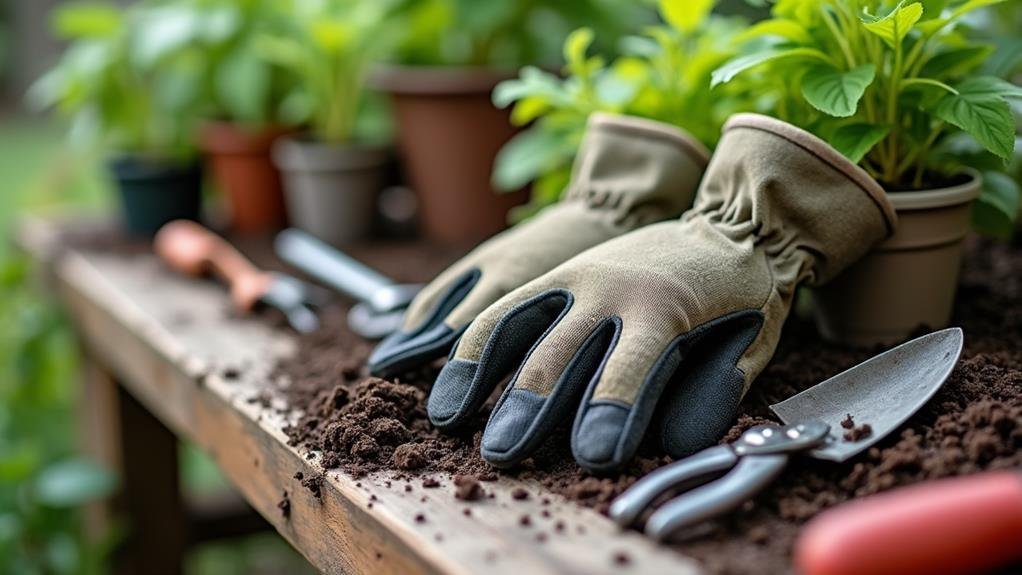
Many gardeners find that durable gloves are a must-have for protecting their hands while digging, planting, and pruning. They shield your skin from thorny plants, sharp tools, and dirt that can irritate or injure.
When choosing gloves, look for materials that are both tough and flexible. Leather, for example, offers great protection while allowing you to grip tools comfortably.
You'll also want to take into account gloves with a good fit. Too loose, and they might slip off during work; too tight, and you'll struggle to move your fingers. Many brands offer a variety of sizes, ensuring you find the perfect pair.
Another feature to keep in mind is waterproofing. If you plan to work in wet conditions or handle damp soil, gloves that repel moisture can keep your hands dry and comfortable.
Versatile Trowel
A gardener's best friend, the versatile trowel, is an essential tool for planting, transplanting, and weeding. This small, handheld tool features a pointed metal blade, making it perfect for digging into soil, breaking up clumps, and creating holes for your plants.
When you need to move a seedling from one pot to another, a trowel simplifies the process, helping you lift the plant without damaging its roots.
Choosing the right trowel is key. Look for one with a comfortable grip, as you'll likely be using it frequently. Stainless steel blades are durable and resist rust, ensuring your trowel lasts season after season.
If you're feeling adventurous, consider a trowel with measuring marks on the blade, which can help you plant at the right depth.
Using your trowel isn't just about planting. It's also handy for weeding; you can easily dig out pesky weeds from their roots.
A versatile trowel can even be used to mix soil or compost in your garden bed. With this tool in your gardening arsenal, you'll feel empowered to tackle any planting challenge that comes your way!
Reliable Watering Can
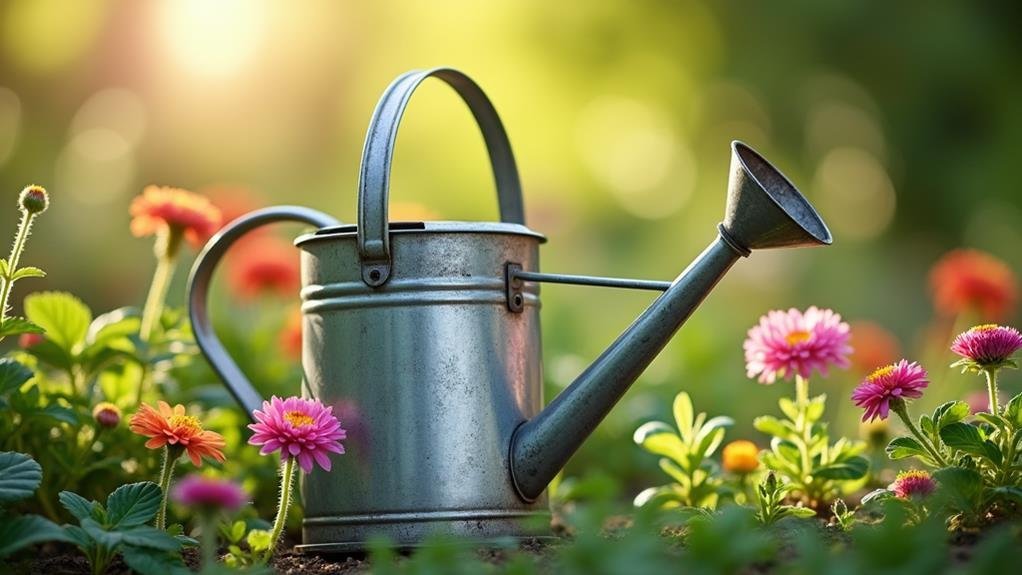
Watering your plants effectively is essential for their growth and health, and a reliable watering can is indispensable for any gardener. When choosing a watering can, look for one that balances well and feels comfortable in your hands.
A lightweight design makes it easier to carry, especially when you're filling it multiple times.
Consider the spout length and design; a longer spout allows you to reach into tight spots, ensuring every plant gets the water it needs. A removable rose can help you control the flow of water, making it perfect for both delicate seedlings and established plants.
Capacity is another factor to keep in mind. A can with a larger volume reduces the number of trips you need to make to refill it, but it shouldn't be so heavy that it strains your wrist.
Don't forget about materials; plastic cans are generally lighter, while metal options are more durable. Whichever you choose, make sure it's easy to clean and won't rust over time.
With a reliable watering can by your side, you'll be well-equipped to nurture your garden to its fullest potential. Happy gardening!
Sturdy Garden Fork
Regarding cultivating your garden, having a sturdy garden fork is essential for turning soil and breaking up compacted earth. This tool isn't just for digging; it's your best friend in relation to aerating soil, which helps plants thrive.
A good garden fork features strong, sharp tines that penetrate tough soil easily, allowing you to mix in organic matter or compost.
When choosing a garden fork, look for one with a comfortable handle that feels good in your hands. You'll want something that can withstand the pressure you'll exert while working. Stainless steel or forged steel options are great choices, as they resist rust and damage over time.
To use your garden fork effectively, insert it into the soil at a slight angle, then lift and turn the soil. This technique not only loosens the earth but also helps incorporate nutrients. Don't be afraid to use your weight for added support.
With a sturdy garden fork in hand, you'll be well on your way to creating a healthy, vibrant garden. It's an investment in your gardening journey that'll pay off every time you dig in!
Effective Hoe
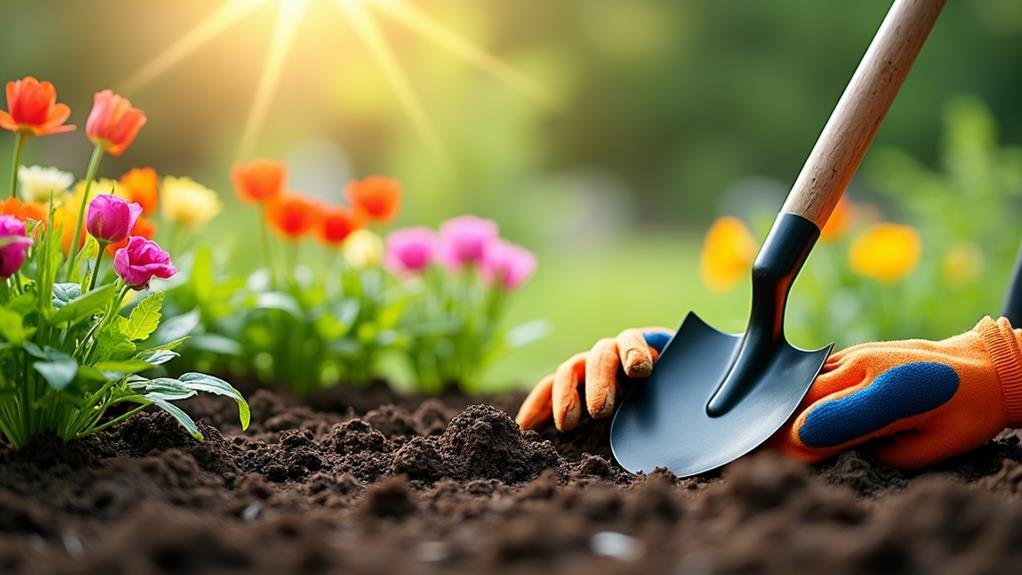
After mastering the use of a sturdy garden fork, it's time to incorporate an effective hoe into your gardening toolkit. A hoe is essential for breaking up soil, shaping rows, and controlling weeds. When choosing a hoe, look for one with a comfortable grip and a sturdy blade. This tool will help you cultivate your garden with ease.
To use your hoe effectively, position yourself with your feet shoulder-width apart. Hold the hoe with both hands and push the blade into the soil using a smooth, steady motion. You can also use a chopping motion to eliminate pesky weeds. Remember, it's not just about strength; technique plays a huge role in how efficiently you work.
Regularly clean your hoe after each use to prevent soil buildup and rust. A well-maintained hoe will last longer and perform better.
Don't forget to reflect on the type of hoe you need; there are various styles, such as the draw hoe and the stirrup hoe, each serving different purposes.
Practical Garden Kneeler
A practical garden kneeler can make all the difference when you're tending to your plants. This simple tool provides a padded surface for your knees, reducing strain and discomfort as you work in your garden. If you've ever spent hours kneeling on hard ground, you know how quickly it can become unbearable.
Many garden kneelers double as benches, allowing you to flip them over and sit while you prune or pot plants. This versatility makes them an excellent investment for any beginner gardener. Look for features like sturdy frames and durable, weather-resistant materials to guarantee longevity.
When choosing a kneeler, consider its height. You want one that suits your body well, enabling you to work comfortably without bending excessively. Some kneelers even come with pockets or storage compartments, keeping your tools within easy reach.
In addition to reducing fatigue, using a garden kneeler can help prevent injuries, especially if you have existing knee or back issues.
Conclusion
With the right tools in hand, you're well on your way to becoming a successful gardener. Investing in essential items like quality pruners, a versatile trowel, and durable gloves will make your gardening tasks easier and more enjoyable. Don't forget about a reliable watering can and a sturdy garden fork to keep your plants thriving. By equipping yourself with these basics, you'll cultivate a thriving garden that brings you joy season after season. Happy gardening!


